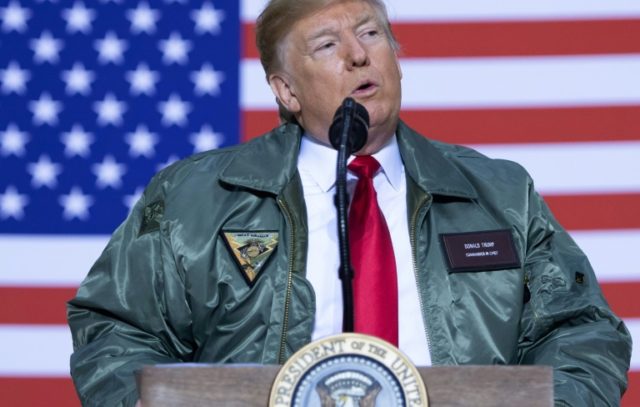U.S. President Donald Trump’s surprise visit to Iraq Wednesday reportedly prompted Iran-linked lawmakers and Tehran-allied militia leaders to condemn the move as a violation of Iraq’s sovereignty and demanded that the United States withdraw its estimated 5,200 troops from the country.
On Wednesday, President Trump and his wife, First Lady Melania Trump, thanked American service members for their sacrifice when they landed at an airbase west of the Iraqi capital of Baghdad and spent three hours with the troops.
In the wake of Trump’s visit, which Iraqi politicians derided as “arrogant and a violation of Iraqi sovereignty,” Iraqi lawmakers ordered U.S. forces to leave the country.
“Politicians from both blocs of Iraq’s divided parliament called for a vote to expel US troops and promised to schedule an extraordinary session to debate the matter,” the Guardian reports.
“Parliament must clearly and urgently express its view about the ongoing American violations of Iraqi sovereignty,” Salam al-Shimiri, a lawmaker loyal to the populist anti-Iran and U.S. Shiite cleric Moqtada al-Sadr, said.
Some factions of the Popular Mobilization Forces/Units (PMF/PMF), a Baghdad-sanctioned umbrella organization for mainly Iran-backed Shiite militiamen also threatened Trump to pull out America’s troops or face consequences.
Qais Khazali, the head of the PMF faction Asaib Ahl al-Haq (AAh), which analysts linked to thousands of attacks on American between before the anti-ISIS offensive, vowed on Twitter that the Iraqi parliament would vote to expel United States forces from Iraq, or the militia and others would force them out by “other means,” Al Jazeera reports.
Harakat Hezbollah al-Nujaba, a wing of the Iraqi PMF group, also declared that the presence of American troops breached the sovereignty of Iraq, Iran’s state-run Press TV reports.
“Trump must be aware that Iraq’s sovereignty came with blood, not the building of bases in this country of resistance and martyrs. The government has a duty to expel US troops as a violation of the country’s sovereignty,” Hashim al-Mousawi, a spokesman for the Nujaba group, told Lebanon-based al-Mayadeen television channel, Iran’s state-run Press TV also notes.
The Kata’ib Hezbollah group, another PMF faction, also threatened that the Shiite militias would force the American withdrawal if necessary, Press TV reveals.
Jafar al-Hussaini, the group’s leader, told al-Mayadeen, “The decision to withdraw US troops belongs to the will of the people and its parliament; the{Hezbollah] resistance will force the United States to withdraw its troops from Iraq. Leaders in the Iraqi resistance vowed to cut the hand that extends to neighboring countries including Syria.”
Not all Iraqi politicians who want the U.S. military to leave their country are linked to world’s leading state-sponsor of terror Iran.
“Sabah al-Saadi, the leader of the Islah parliamentary bloc, called for an emergency session of the Iraqi parliament “to discuss this blatant violation of Iraq’s sovereignty and to stop these aggressive actions by Trump who should know his limits: The US occupation of Iraq is over,” Reuters notes.
Prominent Shiite leader Muqtada al-Sadr leads Islah and opposes the U.S. presence in Iraq as well as Iran’s expanding influence in his country.
The Bina bloc, Islah’s foe in parliament led by Iran-backed militia leader Hadi al-Amiri, also reportedly came out against Trump’s trip to Iraq, the commander-in-chief’s first visit to a war zone since he took office in early 2017.
Trump said there are no plans to withdraw the 5,200 American troops deployed to Iraq, which Pentagon officials have indicated will have the ability to launch attacks into Syria.
Iraq legalized the PMF as an official component of the Iraqi military. Although the U.S. military has repeatedly praised the PMF for their contribution in defeating ISIS, the Pentagon office of the inspector general has deemed the Shiite group a threat to U.S. troops and interests in the Middle East.

COMMENTS
Please let us know if you're having issues with commenting.